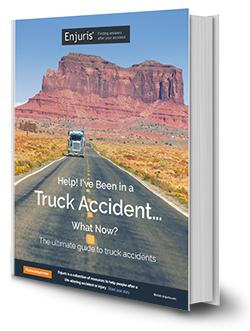Get up to speed on Colorado state personal injury and truck crash law
A car accident always is upsetting, but an accident with a tractor trailer can be absolutely terrifying.
If you were injured in accident with an 18-wheeler in Colorado – or if you're helping someone who has -you will want to know the basics about personal injury and truck accident law in the Rocky Mountain State.
Tractor trailers are more dangerous
Trucks are much larger and heavier than other vehicles. The violence of a crash with a big rig can be devastating. See the Motor Carrier Safety Administration's latest FMCSA annual report on Large Truck and Bus Crash Facts:
In 2014, 3,978 large trucks and buses were involved in fatal crashes, a 5-percent decrease from 2013. From 2013 to 2014, large truck and bus fatalities per 100 million vehicle miles traveled by all motor vehicles decreased by 4 percent, from 0.143 to 0.138.
Common causes of tractor trailer accidents
Because tractor trailers are such large vehicles, driving them responsibly takes training and care.
It's not surprising that truck drivers hold a commercial driver's license (CDL). This means that truck drivers have a higher level of responsibility when driving. They must drive safely. If they fail to do so, drivers and their companies can be held liable in a personal injury lawsuit.
Still, thousands of deadly accidents occur each year across Colorado and the country, and many of them were the truck driver's fault.
The FMCSA did a study of national truck crashes that were the fault of the truck driver. The data indicated that the most common truck crash events were:
- The truck ran out of the travel lane – 32% of the time
- Loss of control of the truck – 29% of the time
- Truck rear ended another vehicle – 22% of the time
In those truck crash events, the data showed these were the most common reasons for the accident:
- Non-performance: Driver fell asleep or was physically impaired
- Recognition: Driver was distracted or inattentive
- Decision: Driver drove too fast, misjudged speed, followed too closely
- Performance: Driver panicked, overcorrected or overcompensated
The study also identified many associated factors that were sometimes to blame for the truck accidents:
- Brake and/or maintenance problems
- Over the counter drug use
- Prescription drug use
- Unfamiliarity with highway
- Alcohol use
If you can prove that the truck driver committed any of the above infractions, you could prevail in a personal injury lawsuit.
Other sources will argue that the majority of truck accidents are actually caused by the driver of the car, not the truck. See a compilation of various reports on CCJ Digital that says this may be upwards of 80% (of interest may be the reaction of truck drivers to the report – be sure to scroll and continue reading).
Traffic violations for CDL holders in Colorado
If the truck driver caused your accident, he could have his CDL suspended. Further, if the truck accident occurred and led to your injuries, he could be successfully sued in civil court for your property and personal damages.
You would need to consult a personal injury attorney on this matter.
It is good to know if the driver has committed a serious violation, as this puts you in a stronger position in a lawsuit.
Common serious traffic violations that result in a suspended Colorado CDL:
- Speeding 15 MPH or more above posted speed limit
- Driving recklessly as stated under Colorado law: driving a truck in willful disregard for others' safety
- Making dangerous and improper lane changes
- Following vehicle ahead too closely
- Driving a tractor trailer without a CDL
- Driving a truck without carrying a CDL
You can see the Colorado CDL handbook online for details.
Legal options for Colorado truck crashes
If you think your accident with a truck is the truck driver's fault, you will need to prove negligence in civil court. Drivers who are found to act negligently do not usually intend to injure you. The liability is due to thoughtless or careless action, or failing to act where a reasonable person would have done so.
A driver, especially a truck driver, has a duty to use ‘reasonable care' to avoid hurting anyone on the road. If the trucker fails to use reasonable care and you are hurt, the trucker and his company can be held liable.
Comparative negligence rules in Colorado
In Colorado, the degree to which you can recover damages for your truck accident is limited by how much you were at fault. In years past, the law in Colorado stated that if you contributed to the truck accident at all, you could be prohibited from recovering damages. This has changed.
Now, if the judge or jury determines you were 25% responsible for the crash, the truck driver would only be liable for 75% of your financial damages.
Damages you can recover in Colorado
If you win a personal injury lawsuit, you can be awarded damages. That amount can include payment for your pain and suffering, as well as other non-economic damages.
However, note that Colorado has a cap on non-economic damages for most personal injury cases of $468,010 (or $936,030 with “clear and convincing evidence”). You also may include in the lawsuit any of your medical expenses. You will especially want to recover those that were not covered by your auto insurance policy.
Also, you may include any loss of income you experienced. Colorado insurance requirements mandate coverage up to $400/week for a maximum of 52 weeks, which can be pursued via the insurance company. You may wish to recover any loss of income above that amount and in the future beyond those first 52 weeks after the truck crash.
Truck crash settlements are most common
Generally, Colorado truck drivers and companies will settle a truck crash personal injury case out of court if the driver was at fault.
Here is why: Colorado juries tend to be unforgiving with truckers and truck companies that leave an innocent driver with crippling injuries. It often is to the benefit of the company and the truck driver to settle before the case goes to trial. You may not win as much compensation in an early settlement. But many truck accident victims are seriously injured. They often need the money to help them to recover from their injuries, and to replace their lost income.
Note the Colorado statute of limitations
The general statute of limitations for personal injury claims in Colorado is two years. However, for the majority of auto and truck negligence cases, the statute of limitations is three years.
Warning: If you fail to file your personal injury case within three years of the date of the truck accident, your case will be dismissed from Colorado court.
Talk to a Colorado personal injury attorney (there's no cost)
If you have been hurt in a Colorado truck accident, you should consult with a qualified personal injury attorney to discuss your legal options.
If you don't have an attorney yet, here are some guides that can help you prepare and choose the best lawyer for your specific case:
What does an injury lawyer do?
A personal injury lawyer helps individuals who have sustained injuries in accidents to recover financial compensation. These funds are often needed to pay for medical treatment, make up for lost wages and provide compensation for injuries suffered. Sometimes a case that seems simple at first may become more complicated. In these cases, consider hiring an experienced personal injury lawyer. Read more
Did you know that truck accident law varies by state?
Need a lawyer?



















